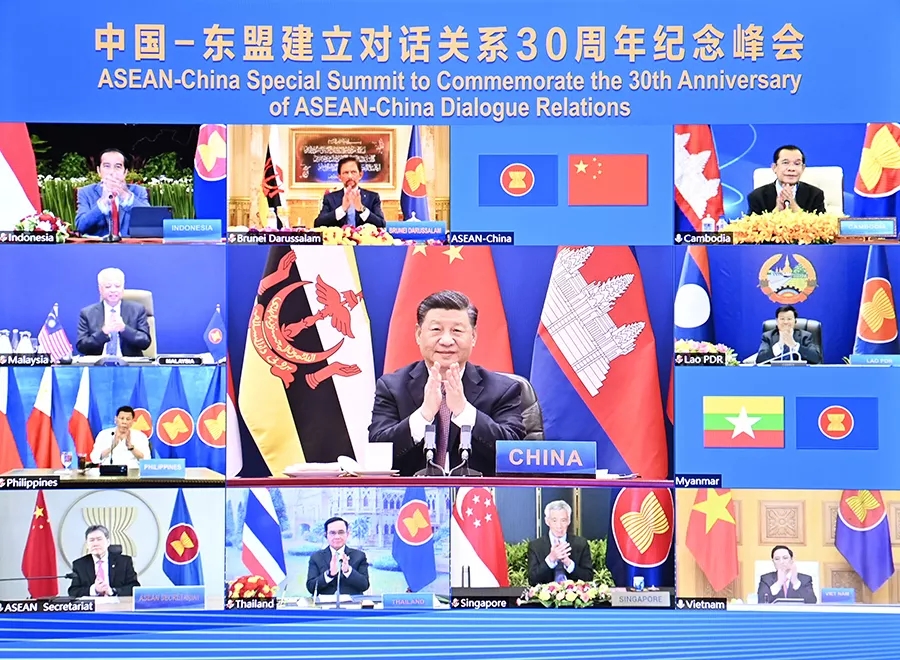点击上方“中国信息安全”订阅
新华社北京3月1日电 经中央网络安全和信息化领导小组批准,外交部、国家互联网信息办公室联合发布《网络空间国际合作战略》(以下简称《战略》)战略”)在 1 日。 该战略以和平发展、合作共赢为主题,以构建网络空间命运共同体为目标,首次全面、系统地就促进网络空间国际交流与合作提出中国主张,为解决全球网络空间治理难题贡献中国方案。 空间国际交流与合作的战略性文件。
这是中国首次就网络问题发布国际战略。 战略指出,网络空间给人类带来重大机遇,也带来许多新问题新挑战。 各国在网络空间互联互通,利益交融,休戚与共。 国际社会应携手加强对话交流,共同维护网络空间的和平、稳定与繁荣,共同构建网络空间命运共同体。
该战略提出,应在和平、主权、共治、普惠四项基本原则基础上推进网络空间国际合作。 该战略主张各国切实遵守《联合国宪章》的宗旨和原则,确保网络空间的和平与安全; 坚持主权平等,不搞网络霸权,不干涉别国内政; 全球互联网治理体系; 促进网络空间优势互补、共同发展,弥合“数字鸿沟”,让所有人共享互联网发展成果。
该战略确立了中国参与网络空间国际合作的战略目标:坚定维护国家网络空间主权、安全和发展利益,保障互联网信息安全有序流动,提升国际互联互通水平,维护国家和平、安全与稳定。推动网络空间国际法治建设,推动全球数字经济发展,深化网络文化交流互鉴,让互联网发展成果惠及全球,更好造福各国人民.
该战略还从维护网络空间和平稳定、构建以规则为基础的网络空间秩序、拓展网络空间伙伴关系、推进全球互联网治理改革九个方面提出了中国推动和参与网络空间国际合作的行动计划。打击网络恐怖主义和网络犯罪,保护公民权益,促进数字经济发展,加强全球信息基础设施建设和保护,促进网络文化交流互鉴。
该战略强调,在推进建设网络强国战略部署的同时,中国将秉持以合作共赢为核心的新型国际关系理念,致力于同国际社会携手加强沟通交流,深化互利合作,打造新的合作伙伴。 携手构建人类命运共同体,为建设安全稳定繁荣的网络空间作出更大贡献。
网络空间国际合作战略
目录
前言
第一章机遇与挑战
第二章 基本原则
一、和平原则
二、主权原则
三、共治原则
四、包容性原则
第三章 战略目标
一、维护主权安全
二、构建国际规则体系
三、促进互联网公平治理
四、保障公民合法权益
五、推进数字经济合作
6.搭建线上文化交流平台
第四章行动计划
一、倡导和促进网络空间的和平与稳定
二、推动以规则为基础的网络空间秩序建设
三、继续扩大网络空间伙伴关系
四、积极推进全球互联网治理体系改革
五、深化打击网络恐怖主义和网络犯罪国际合作
6.倡导保护公民隐私权等权益
七、促进数字经济发展和共享数字红利
八、加强全球信息基础设施建设和保护
九、促进网络文化交流互鉴
结论
前言
“网络空间是人类共同活动的空间,网络空间的前途命运由世界各国共同承担。各国应加强沟通,扩大共识,深化合作,共同构建网络空间命运共同体。”
– 中国国家主席习近平,2015 年 12 月 16 日
当今世界,以互联网为代表的信息技术日新月异,引领社会生产新变革,为人类生活创造新空间,拓展国家治理新领域,极大提高人类认识和改造能力世界。
互联网作为人类社会的共同财富,已经把世界变成了一个“地球村”。 各国在网络空间互联互通,利益交融,休戚与共。 维护网络空间和平与安全,促进开放合作,共建网络空间命运共同体,符合国际社会的共同利益,也是国际社会的共同责任。
《网络空间国际合作战略》全面宣示了中国在网络空间相关国际问题上的政策立场,系统阐述了中国网络空间对外工作的基本原则、战略目标和行动要点,旨在指导中国参与网络空间国际合作。未来。 交流合作,推动国际社会共同努力,加强对话合作,共同建设和平、安全、开放、合作、有序的网络空间,建立多边、民主、透明的全球互联网治理体系。
第一章机遇与挑战
在世界多极化、经济全球化、文化多元化、全球治理体系深刻变革的背景下,人类迎来了信息革命的新时代。 以互联网为代表的信息通信技术日新月异,深刻改变着人们的生产生活方式,日益激发市场创新,促进经济繁荣,促进社会发展。 网络空间日益成为信息传播的新渠道、生产生活的新空间、经济发展的新引擎、文化繁荣的新载体、社会治理的新平台、交流合作的新纽带,国家主权的新领域。
网络空间给人类带来了巨大机遇,但也带来了许多新问题和新挑战。 网络空间安全稳定已成为全球性问题,事关各国主权、安全和发展利益。 互联网领域发展不平衡、规则不健全、秩序不合理等问题日益突出。 国家和地区之间的“数字鸿沟”不断扩大。 关键信息基础设施存在较大风险和隐患。 全球互联网基础资源管理体系难以体现大多数国家的意愿和利益。 网络恐怖主义已成为全球公害,网络犯罪蔓延。 滥用信息通信技术干涉别国内政、进行大规模网络监视等活动时有发生。 网络空间缺乏普遍有效规范各方行为的国际规则,自身发展受到制约。
面对问题和挑战,任何国家都不可能独善其身。 国际社会应本着相互尊重、互谅互让的精神开展对话合作,实现网络空间全球治理以规则为基础。
第二章 基本原则
中国始终是世界和平的建设者、全球发展的贡献者、国际秩序的维护者。 中国坚定不移走和平发展道路,坚持正确义利观,推动建立以合作共赢为核心的新型国际关系。 中国网络空间国际合作战略的主题是和平发展,以合作共赢为核心,把倡导和平、主权、共治、普惠作为网络空间国际交流与合作的基本原则。
一、和平原则
网络空间互联互通,各国利益日益交融。 一个安全、稳定、繁荣的网络空间,对各国和世界都具有重要意义。
国际社会必须切实遵守《联合国宪章》的宗旨和原则,特别是不使用或威胁使用武力以及和平解决争端的原则,确保网络空间的和平与安全。 各国应共同反对利用信息通信技术实施敌对侵略行为,防止网络军备竞赛,防止网络空间冲突,坚持和平解决网络空间争端。 我们应该摒弃冷战思维、零和博弈和双重标准,在充分尊重别国安全的基础上,以合作求和平,努力在共同安全中实现自身安全。
网络恐怖主义是影响国际和平与安全的新威胁。 国际社会应采取切实措施防范和合作打击网络恐怖主义。 防止恐怖分子利用互联网传播恐怖极端思想,策划实施恐怖活动。
二、主权原则
《联合国宪章》确立的主权平等原则是当代国际关系的基本准则,涵盖国与国交往的各个领域,也应适用于网络空间。 各国应尊重彼此自主选择网络发展道路、网络管理模式、互联网公共政策和平等参与国际网络空间治理的权利,不搞网络霸权,不干涉别国内政,不从事、纵容和支持危害他国国家安全的网络空间活动。 活动。
明确网络空间主权,不仅可以体现政府依法管理网络空间的责任和权利,还有助于各国搭建政府、企业和社会团体良性互动的平台,为网络空间的发展创造平台。信息技术与国际交流与合作。 健康的生态环境。
各国政府有权依法管理网络,对本国境内的信息通信基础设施、资源和信息通信活动具有管辖权,有权保护本国的信息系统和信息资源免受威胁、干扰、攻击和破坏,并确保公民在网络空间中的安全。 合法权益。 各国政府都有权制定自己的互联网公共政策和法律法规,不受任何外来干涉。 各国在按照主权平等原则行使自身权利的同时,也需要履行相应的义务。 各国不得利用信息通信技术干涉别国内政,不得利用自身优势损害别国信息通信技术产品和服务供应链安全。
三、共治原则
网络空间是人类共同的活动空间,需要世界各国共同建设、共同治理。 网络空间国际治理首先应坚持多边参与。 各国不分大小强弱贫富,都是国际社会的平等成员,都有权通过国际网络治理机制和平台,平等参与网络空间国际秩序和规则建设,确保网络安全。网络空间的未来发展是各国人民的共同利益。 掌握。
二是坚持多方参与。 发挥政府、国际组织、互联网企业、技术社群、非政府组织、公民个人的作用,构建全方位、多层次的治理平台。 各国应加强沟通交流,完善网络空间对话协商机制,共同制定网络空间国际规则。 联合国作为重要渠道,应充分发挥协调作用,协调各方立场,凝聚国际共识。 其他国际机制和平台也应发挥各自优势,提供有益补充。 国际社会应共同管理和公平分配互联网基础资源,建立多边、民主、透明的全球互联网治理体系,实现互联网资源共享、责任共担、合作治理。
四、包容性原则
互联网与各行业的融合发展,对各国经济结构、社会形态和创新体系产生了全面的、革命性的影响,为世界经济增长和可持续发展目标的实现提供了强劲动力。 推动互联网普惠惠及所有地区和国家,将为有效落实2030年可持续发展议程提供助力。
国际社会应继续推进互联网领域开放合作,丰富开放内涵,提高开放水平,搭建更多交流合作平台,促进网络空间优势互补、共同发展,让共享成果共享。推动互联网发展,实现信息社会世界峰会确定的目标。 建设以人为本、面向发展、包容的信息社会的目标。
各国应积极推进双边、区域和国际发展合作,特别是加大对发展中国家网络能力建设的资金和技术援助,帮助发展中国家抓住数字机遇,弥合“数字鸿沟”。
第三章 战略目标
中国参与网络空间国际合作的战略目标是坚定维护国家网络主权、安全和发展利益,保障互联网信息安全有序流动,提升国际互联互通水平,维护网络空间和平、安全与稳定,推动网络空间国际法治建设,推动全球数字经济发展,深化互联网文化交流互鉴,让互联网发展成果惠及全世界,更好造福各国人民。
一、维护主权安全
中国致力于维护网络空间的和平与安全,致力于构建以国家主权为基础的公平合理的网络空间国际秩序,积极推动和凝聚国际共识。 中方坚决反对任何国家通过互联网干涉别国内政,主张各国都有权利和责任维护自身网络安全,通过国家法律和法规保护各方在网络空间的合法权益。政策。 网络空间加强军备和威慑的倾向不利于国际安全和战略互信。 中国致力于推动各方切实遵守和平解决争端、不使用或威胁使用武力等国际关系基本准则,建立磋商和调解机制,预防和避免冲突,防止网络空间成为一个新的战场。
网络空间国防力量建设是我国国防和军队现代化建设的重要组成部分,始终坚持积极防御的军事战略。 中国将充分发挥军队在维护国家网络空间主权、安全和发展利益中的重要作用,加快网络空间力量建设,提高网络空间态势感知、网络防御、保障国家网络空间作战和参与国际合作能力,遏制和控制网络空间。 应对重大太空危机,保障国家网络安全,维护国家安全和社会稳定。
二、构建国际规则体系
网络空间作为新领域,迫切需要制定相关规则和行为准则。 中国主张在联合国框架下制定各国普遍接受的网络空间国际规则和国家行为规范,确立各国和各行为体在网络空间应遵循的基本准则,规范各方行为,推动各国合作维护网络空间安全。 ,稳定和繁荣。 中国支持并积极参与国际规则制定进程,将继续加强与国际社会的对话与合作,做出自己的贡献。
中国是网络安全的坚定捍卫者。 中国也是黑客攻击的受害者。 中方反对任何形式的黑客攻击。 无论何种黑客攻击行为违法犯罪,都应依据法律和相关国际公约予以打击。 网络攻击通常是跨国的,难以追踪。 中方主张各国通过建设性协商与合作,共同维护网络空间安全。
三、促进互联网公平治理
中国主张通过国际社会平等参与、共同决策,构建多边、民主、透明的全球互联网治理体系。 各国应享有平等参与互联网治理的权利。 公平配置互联网基础资源,共同管理互联网根服务器等关键信息基础设施。 要确保相关国际进程的包容性和开放性,加强发展中国家的代表性和发言权。
中方支持政府、国际组织、互联网企业、技术社区、非政府组织、公民个人等各利益攸关方加强交流与合作。 在上述治理模式中,各利益相关方应发挥与其作用相匹配的作用,政府应在互联网治理尤其是公共政策和安全领域发挥关键主导作用,实现共同参与、科学管理、民主决策。制作。
四、保障公民合法权益
中国支持互联网自由开放,充分尊重公民在网络空间的权利和基本自由,保障公众在网络空间的知情权、参与权、表达权和监督权,保护个人在网络空间的隐私权。 同时,网络空间也不是“法外之地”。 与现实社会一样,网络空间既要促进自由我国倡导的是什么军事战略方针,又要维护秩序。 中国致力于推进网络空间有效治理,实现信息自由流动与国家安全和公共利益有机结合。
五、推进数字经济合作
中国大力实施网络强国战略、国家信息化战略、国家大数据战略和“互联网+”行动计划,大力发展电子商务,着力推动互联网与实体经济深度融合,促进优化资源配置,促进全要素生产率的提高。 在推动创新发展、转变经济增长方式、调整经济结构中发挥积极作用。
中国秉持公平、开放、竞争的市场理念,在发展自身的同时,坚持合作包容原则,推动全球投资贸易发展,推动全球数字经济发展。 中国主张在国际社会促进公平、自由贸易,反对贸易壁垒和贸易保护主义,推动建立开放、安全的数字经济环境,确保互联网服务经济发展和创新。 中方主张进一步推动实现公平、合理、普遍上网、互联网技术普及和网络语言多样化,加强中国与其他国家和地区在网络安全和信息技术领域的交流与合作,共同推动互联网发展。发展和创新互联网技术,确保人人平等分享数字红利,实现网络空间可持续发展。
中国坚持以安全保障发展,以发展促进安全。 维护数字经济健康强劲发展,既不能追求绝对安全阻碍发展活力,限制开放互通,禁锢技术创新,更不能以市场自由化、贸易自由化为借口,规避必要的限制。安全监管措施。 不同国家和地区的互联网发展水平和网络安全防护能力不同。 应为发展中国家提高网络安全能力提供力所能及的帮助,弥合发展中国家与发达国家之间的“数字鸿沟”,实现数字经济互利共赢。 弥补全球网络安全的短板。
6.搭建线上文化交流平台
互联网是传播人类优秀文化、弘扬正能量的重要载体。 网络空间是人类共同的精神家园。 各国应加强合作,共同肩负起利用互联网传承优秀文化的重任,培育和发展积极向上的互联网文化,充分发挥文化在滋养人类、滋养社会、促进经济发展中的重要作用,共同推动网络文明建设和网络文化繁荣发展。
中国愿同各国一道,充分发挥互联网传播平台优势,通过互联网搭建国际交流桥梁,促进各国优秀文化交流互鉴。 加强网络文化传播能力建设,促进国际网络文化多元化发展,丰富人们的精神世界,推动人类文明进步。
第四章行动计划
中国将积极参与网络领域相关国际进程,加强双边、区域和国际对话与合作,增进国际互信,谋求共同发展,共同应对威胁,最终达成网络空间国际规则。为各方普遍接受,构建公平合理的全球网络空间治理体系。
一、倡导和促进网络空间的和平与稳定
参与双边和多边互信措施讨论,采取预防性外交措施,通过对话协商应对各种网络安全威胁。
加强对话我国倡导的是什么军事战略方针,研究网络领域影响国际和平与安全的新威胁,共同遏制信息技术滥用,防止网络空间军备竞赛。
推动国际社会讨论网络空间的和平性质,从维护国际安全和战略互信、防止网络冲突的角度研究国际法在网络空间的适用。
二、推动以规则为基础的网络空间秩序建设
充分发挥联合国在制定网络空间国际规则方面的重要作用,支持和推动联合国大会通过信息和网络安全相关决议,积极推动和参与网络空间国际规则等进程。联合国信息安全政府专家组。
上海合作组织成员国于2015年1月向联合国大会提交了《信息安全国际行为准则》的更新文本。《行为准则》是世界上第一份全面系统阐述的文件网络空间行为准则。 它是中国和其他上合组织成员国为推动国际社会制定网络空间行为准则而提供的重要公共安全产品。 中方将继续就“一带一路”倡议加强国际对话,争取国际社会广泛理解和支持。
支持国际社会普遍平等参与网络问题国际讨论和磋商。
三、继续扩大网络空间伙伴关系
中国致力于同国际社会各方建立广泛的合作伙伴关系,积极拓展同各国网络事务对话机制,广泛开展双边网络外交政策交流和务实合作。
举办世界互联网大会(乌镇峰会)等国际会议,继续与有关国家举办双边互联网论坛,在中日韩、东盟地区论坛、博鳌论坛等框架下举办互联网问题研讨会亚等,拓展网络对话合作平台。
推动和深化上合组织与金砖国家网络安全务实合作。 推动东盟地区论坛网络安全进程均衡发展。 积极推动和支持亚信、中非合作论坛、中阿合作论坛、中拉论坛、亚非法律协商组织等区域组织开展网络安全合作。 推动APEC、G20等组织在互联网和数字经济领域开展合作的倡议。 探索与网络领域其他区域组织的交流对话。
四、积极推进全球互联网治理体系改革
参与联合国信息社会世界峰会成果落实后续进程,推动国际社会巩固和落实峰会成果共识,公平分享信息社会发展成果信息社会。
推进联合国互联网治理论坛机制改革,推动论坛在互联网治理中发挥更大作用。 加强论坛对互联网治理事项的决策能力,推动论坛获得稳定的资金来源,制定公开透明的相关成员遴选和报告提交程序。
参与旨在促进互联网关键资源公平分配和管理的国际讨论,积极推动ICANN的国际化改革,使其成为真正独立的国际组织,不断提高其决策的代表性和公开性、透明化的运作。 积极参与和推动世界经济论坛“互联网的未来”行动倡议等全球互联网治理平台活动。
五、深化打击网络恐怖主义和网络犯罪国际合作
Discuss the code of conduct and specific measures for the international community to cooperate in combating cyber terrorism, including exploring the formulation of an international convention against terrorism in cyberspace, to enhance the consensus of the international community on combating cybercrime and cyberterrorism, and provide a basis for countries to carry out specific law enforcement cooperation.
Support and promote the UN Security Council to play an important role in international cooperation against cyber terrorism.
Support and promote the work of the United Nations to combat cybercrime, participate in the work of the United Nations Commission on Crime Prevention and Criminal Justice, the United Nations Group of Governmental Experts on Cybercrime and other mechanisms, and promote the discussion and formulation of global international legal instruments against cybercrime within the framework of the United Nations.
Strengthen regional cooperation, rely on the Asia-Pacific region's annual meeting and coordination mechanism to carry out cooperation in combating information technology crimes, actively participate in relevant cooperation with regional organizations such as the ASEAN Regional Forum, and promote the institutional arrangements for the BRICS countries to combat cybercrime and cyberterrorism.
Strengthen policy exchanges and law enforcement cooperation with other countries to combat cybercrime and cyberterrorism. Actively explore the establishment of an institutionalized dialogue and exchange platform for combating cyber terrorism, establish a bilateral police cooperation mechanism with the police of other countries, improve the judicial assistance mechanism for combating cybercrime, and strengthen the exchange of technical experience in combating cybercrime.
6. Advocate the protection of citizens' rights and interests such as the right to privacy
Support the discussions of the United Nations General Assembly and the Human Rights Council on privacy protection issues, and promote the establishment of principles of personal privacy protection in cyberspace. Promote countries to take measures to stop the use of the Internet to infringe on personal privacy, and exchange practices and practices on respecting and protecting personal privacy in cyberspace.
Promote enterprises to raise awareness of data security protection, support enterprises to strengthen industry self-discipline, and discuss best practices in cyberspace personal information protection. Promote cooperation between the government and enterprises to jointly protect personal privacy in cyberspace.
7. Promote the development of the digital economy and the sharing of digital dividends
Promote the implementation of the goal of building a people-centered, development-oriented, and inclusive information society set by the United Nations World Summit on the Information Society, so as to promote the implementation of the 2030 Agenda for Sustainable Development.
Support Internet-based innovation and entrepreneurship, and promote the digital transformation of industry, agriculture, and service industries. Promote the informatization development of small, medium and micro enterprises. Promote investment in the ICT sector. Expand broadband access and improve broadband quality. Improve the digital skills of the public and increase digital inclusion. Enhance the availability, integrity, confidentiality and reliability of online transactions, and develop credible, stable and reliable Internet applications.
Support the provision of cyber security capacity building assistance to developing countries, including technology transfer, key information infrastructure construction and personnel training, etc., to transform the "digital divide" into digital opportunities, and allow more developing countries and their people to share the benefits brought by the Internet. Development Opportunities.
Promote the formulation of comprehensive cyberspace trade rules and promote the effective coordination of relevant policies of various countries. Carry out international cooperation in e-commerce, and improve the level of facilitation in customs clearance and logistics. Protect intellectual property rights, oppose trade protectionism, form a world network market, and promote the prosperity and development of the global network economy.
Strengthen Internet technology cooperation and sharing, promote technical cooperation among countries in the fields of network communications, mobile Internet, cloud computing, Internet of Things, and big data, jointly solve Internet technology development problems, and jointly promote the development of new industries and new formats. Strengthen talent exchanges and jointly cultivate innovative network talents.
Closely combined with the "Belt and Road" construction, promote and support China's Internet companies in the joint manufacturing, finance, information and communication fields to take the lead in going out, participate in international competition in accordance with the principle of fairness, jointly explore the international market, and build a cross-border industrial chain system. Encourage Chinese enterprises to actively participate in the capacity building of other countries, help developing countries develop distance education, telemedicine, e-commerce and other industries, and promote the social development of these countries.
8. Strengthen the construction and protection of global information infrastructure
Jointly promote the construction of global information infrastructure and pave the way for smooth information flow. Promote the interconnection of information infrastructure with neighboring countries and other countries and the construction of the "Belt and Road", so that more countries and people can share the development opportunities brought by the Internet.
Strengthen international cooperation, raise the awareness of protecting critical information infrastructure, promote the establishment of an orderly sharing mechanism for government, industry and enterprise network security information, and strengthen the security protection of critical information infrastructure and its important data.
Promote countries to reach a consensus on the protection of critical information infrastructure, formulate cooperation measures for the protection of critical information infrastructure, and strengthen legislation, experience and technical exchanges on the protection of critical information infrastructure.
Promote the strengthening of cooperation among countries in early warning and prevention, emergency response, technological innovation, standards and regulations, and information sharing, and improve the ability to prevent and respond to cyber risks.
9. Promoting Network Cultural Exchange and Mutual Learning
Promote the development of network cultural cooperation among countries, let the Internet fully display the achievements of civilizations of all countries and nations, become a platform for cultural exchanges and mutual learning, and enhance emotional exchanges and spiritual communication between people of all countries. Taking the animation and game industry as one of the key areas, pragmatically carry out cultural cooperation with countries along the “Belt and Road”, and encourage Chinese enterprises to fully rely on local cultural resources to provide differentiated online cultural products and services. Utilize domestic and foreign online culture expo trading platforms to promote Chinese online cultural products to go global. Support Chinese enterprises to participate in important international network cultural exhibitions. Promote the overseas landing of Internet cultural enterprises.
结论
The 21st century is the era of network and information technology. At a new historical starting point, China has proposed the grand goal of building a cyber power. This is an important measure to implement the "Four Comprehensives" strategic layout, and it is inevitable to realize the "Two Centenary" goals and the Chinese Dream of the great rejuvenation of the Chinese nation. 选择。 China has always been a builder, maintainer and contributor of cyberspace. The development of China's Internet information industry will not only benefit the Chinese people, but also contribute to the security and development of the global Internet.
While promoting the strategic deployment of building a cyber power, China will uphold the concept of a new type of international relations centered on win-win cooperation, and is committed to joining hands with the international community to strengthen communication and exchanges, deepen mutually beneficial cooperation, build new partners for cooperation, and create A community with a shared future for mankind, making greater contributions to building a safe, stable, and prosperous cyberspace.






